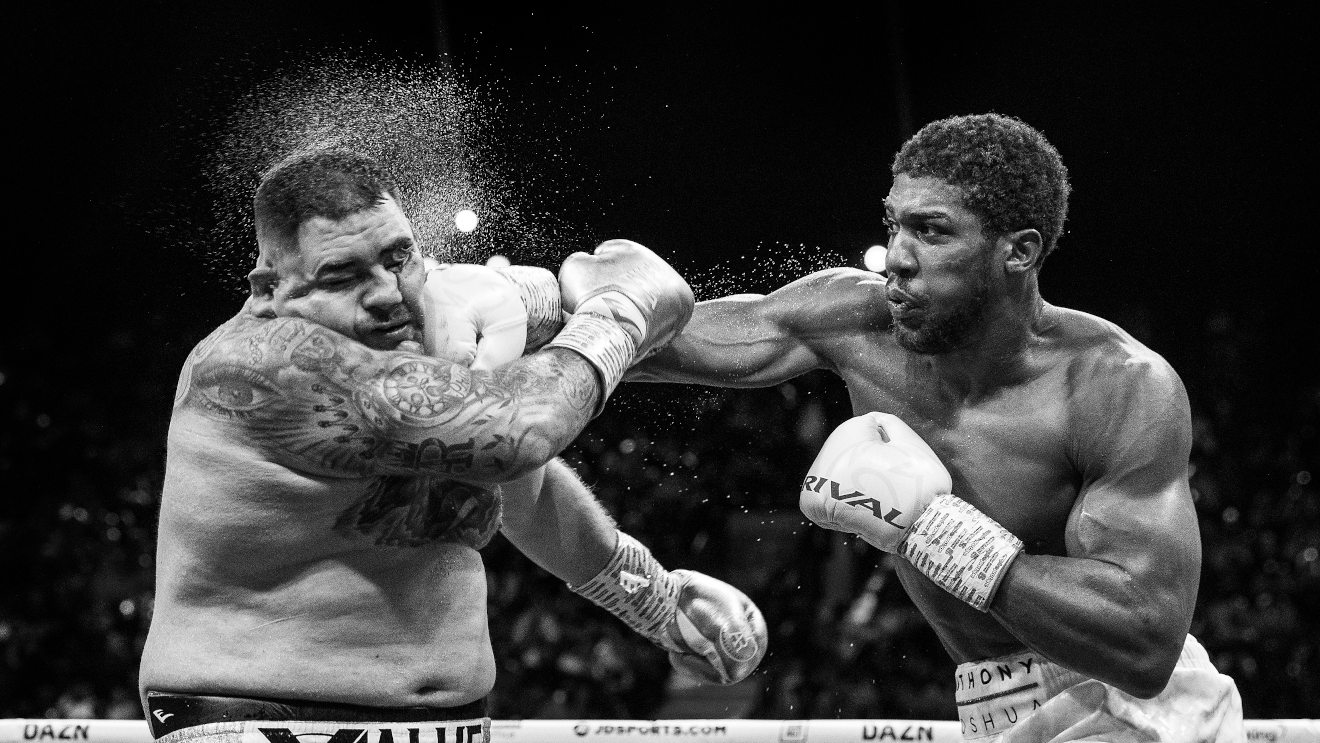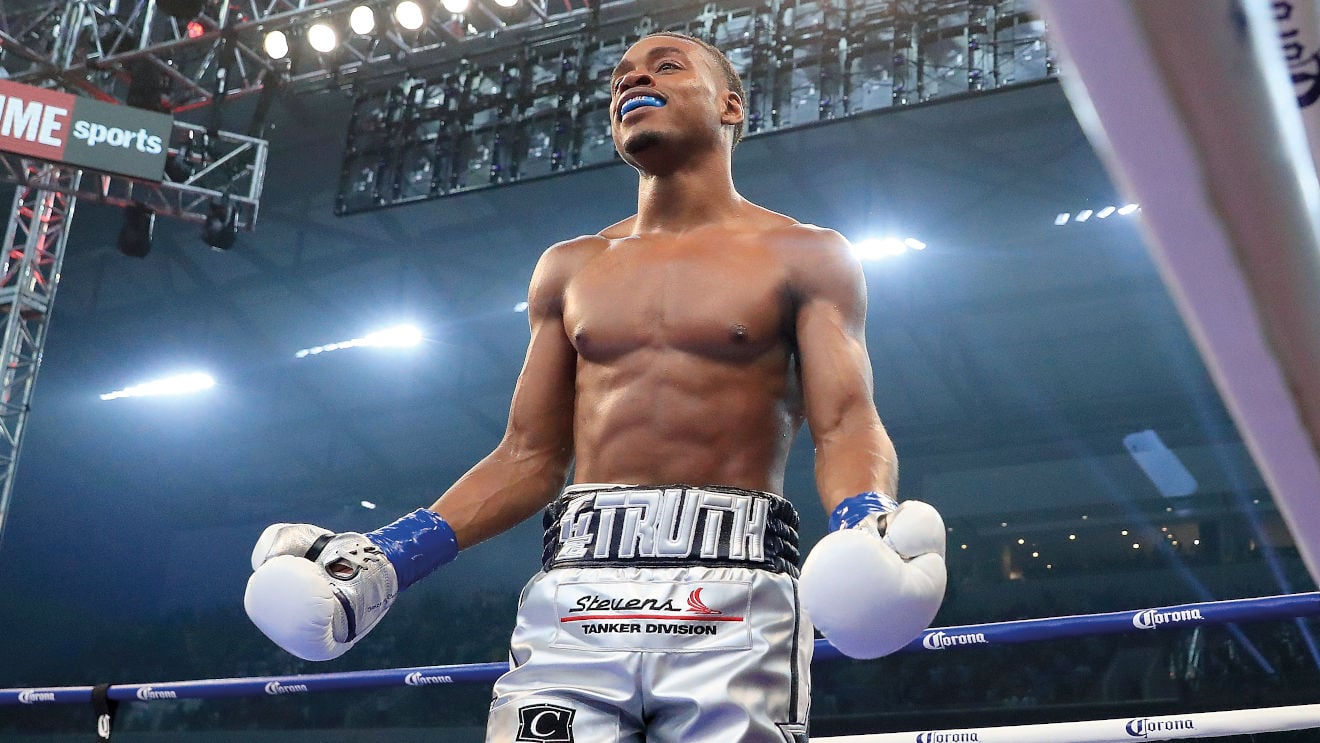WITH the opening bell mere seconds away, Andy Ruiz Jnr took off his white t-shirt and his stomach spilled down his shorts like custard over an apple pie. It was among the most depressing reveals in boxing history. In that moment, as Ruiz’s rampant disregard for both his body and the prestigious business of being world heavyweight king were exposed, the anticipation surrounding his rematch with Anthony Joshua threatened to disappear completely.
That anticipation – the kind breathless expectation you only get at the biggest of fights – had been intense. The scene in Saudi Arabia was set as the fighters made their way to the ring through puddles of rain in a sodden makeshift stadium hounded by the threat of a desert storm, and ringsiders sat in ponchos that had been delivered from Dubai the day before.
It was impossible not to feel that something truly memorable, something historical, would soon follow. Hours before, as the media were transferred from their hotels in coaches to the fringes of the fight site, the clouds in the sandy skyline opened. We went through gates where security officers soberly checked our bags, pockets and clothing before we were led to creaking minibuses that took us through barren land to the evening’s battleground. Night swallowed day as workers applying finishing touches to sand sculptures and signage raced against time. We queued to be checked by security once again before trooping into a huge media tent approximately 50 metres from the centre of the open air 15,000-seater stadium. The sound of the rain pelting the roof echoed around us.
There were real concerns, less than 30 minutes before the first fight was due to begin, that the event was in danger. Contingency plans, that included losing two fights from the undercard, losing the entire undercard and even the entire bill, were discussed. After all, Diriyah Stadium, which was non-existent as recently as October and will be demolished in January, was designed for the desert where rain falls only 14 days a year.
But the problem was not the rain, Boxing News was told, it was the gusty wind. As it lashed through the stadium organisers were warned that if it rose above 72 kmph, the huge screens above the ring were in danger of crashing down. Flag poles in the corners of the stadium were removed as a precaution. Lightning was reported within 10 km of the site. Yet the storm halted its march and the fights began as rain continued to fall. It stopped just minutes before the main event. It felt like a sign, somehow, that a battle of the ages was nigh.

Joshua and Ruiz, and their teams, were unaware of the dangers outside. The challenger could be seen dripping with sweat in his dressing room minutes before he put on his elegant long white robe that had the names of his young relatives sown into the bottom of it. Plastic bags were placed over his boots and he made his long walk to the ring through winding corridors and out into a welcoming crowd. Joshua was pumped up, determined to put some wrongs right, and ringsiders observed the obvious emotion that was etched into his face.
Inside the ring he circled the perimeter, leant on the ropes and looked out into the audience who were chanting his name. Briefly he seemed lost in this alien land. Carl Froch, who was working for Sky Sports, got up from his seat and appeared to ask Eddie Hearn – the show’s promoter – if Joshua was okay. “He’s alright, he’s alright,” an apprehensive Hearn said as “AJ” started to shadow box violently, punctuating his final warm-up with a left hook designed to expel the nerves within.
Joshua went on to produce what deserves to be regarded as one of best performances of his career to date, despite his rival’s disregard for the occasion. After 36 minutes of intense concentration, decorated with boxing skill and intelligence, the Englishman became only the fourth boxer in history to regain world heavyweight titles in an immediate rematch. Ruiz, meanwhile, rolls off towards the wasteland of boxing supernovas, remembered only for one standout victory and a failure to cope with the consequences of it.

The Mexican, who is based in California, has never been one to inspire awe when stripped to the waist, it’s true. But watching him drag his pasty gut to centre ring, it was clear that the 15lbs he had put on in the six months since their first encounter was not a product of lifting weights, nor any part of a tactical masterplan. Back in June, he made a mockery of any doubts he wasn’t built for the job. This time, after failing to repel the temptations of wealth, he made only a mockery of himself.
“I was overweight, man, I really was,” a remorseful Ruiz said after losing a unanimous 12-round decision. “I thought being bigger would make me stronger, but I was wrong. I should have trained harder and listened to my team and my coaches. Then I could have fought like I did on June 1st. I shouldn’t have put this weight on, it stopped me from being as fast and letting my hands go.”
As likeable and honest as Ruiz remains, it’s also hard to feel sympathy for him given the magnitude of this contest. A product of one of the most exciting upsets in recent memory, this sequel had all the ingredients to make its mark in history. The paying punters, both in Diriyah and at home, deserved more from the defending WBA, IBF and WBO champion. Joshua, too, should feel cheated that his triumph was diluted by such poor preparation from his opponent. But Ruiz himself is the one who will be hurting the most after taking his ‘I’m fat and I don’t care’ image too far; one fears he will be haunted by it for the rest of his life.
In sharp contrast, “AJ” – 10lbs lighter than in June – was in pristine fighting condition. He boxed and moved impressively and his focus in battle better than ever before. It’s likely that the result would have been the same, irrespective of Ruiz’s condition, such was his dominance and improvement since that Miracle On 32nd Street when he was astonishingly stopped in seven rounds inside Madison Square Garden.
That he accepted this rematch so soon after such an embarrassing loss spoke volumes about his character. It is disrespectful to dismiss the strength of mind that was required to perform, not only against his bogeyman but also against opposition to the Saudi setting. Whatever one’s thoughts on the country, it seemed unfair that Joshua – a boxer by trade – was expected to prepare for the most important bout of his life while being constantly questioned about the human rights atrocities of a nation he knew little about. It should be noted that many athletes and entertainers embraced the riches on offer in the Middle East before him. Few faced the criticism Joshua has.

We shouldn’t forget either – though it’s easy to do so now given what transpired – how many educated observers picked against him in the return. The first bout can now perhaps be written off as a wake-up call, one where he slipped too far into presumption that the task ahead was an easy one. The day after the bout he told the BBC that an unnamed illness that required an operation was another huge factor. Whatever the reason for it, his defeat back then was so complete, it defied boxing logic that he would turn the tables so convincingly.
Robert McCracken, Joshua’s coach who took unforgivable stick after the first fight, should also take a bow. He cemented his reputation as one of the leading trainers in the world by designing faultless tactics to defeat Ruiz. During the fight, refereed by Luis Pabon, he could be heard bellowing at Joshua whenever he threatened to deviate from the plan.
“I wanted to show the world the two sides to this beautiful sport – there’s hitting and there’s not getting hit,” a euphoric Joshua said after being named the unanimous decision winner via scores of 119-109 and 118-110 (twice). Boxing News also scored the bout 10 rounds to two for the new champion.
Not getting hit has rarely been a priority for the 30-year-old. As he thundered to the top of the division, ignoring warnings from Dillian Whyte, Wladimir Klitschko and Alexander Povetkin along the way, Joshua grew to disregard the fundamentals he had been taught many years ago, preferring instead to rely on his vaunted power. In the summer, Ruiz taught him a lesson he has promised never to forget. This time, the challenger wisely opted to make winning a priority above all else.
Back home, hundreds of miles away from the action, Joshua was the subject of criticism from some fans for his safety-first approach. Yet it seems cruel and somewhat short-sighted to have expected the Watford man to do his fighting in the only place where the immobile Ruiz had any chance of being effective – the trenches – or to take unnecessary risks when his livelihood and reputation was at stake.

Even so, an early finish seemed forthcoming at the end of the first round. Joshua pivoted to the side and shelled the oncoming Ruiz with his right fist. The thick skin beneath the champion’s left eyebrow split. As the blood gathered in the creases of Ruiz’s face, doubts multiplied about his ability to replicate his success from fight one.
Already glowing red, the champion’s head came under fire again in the second session. Another right from Joshua smacked the target but Ruiz, still ambitious, refused to yield. He trundled into position and managed to score with two jabs before a purposeful left hook, fired from a crouch, whistled past Joshua’s jaw and reminded him to stay away. At the end of the round it was the challenger who was nursing a cut, also above the left eye.
McCracken implored his man to box clever between rounds. Advice banked, Joshua got on his toes in the third, making the most of every inch of the 26ft ring. His jab – which was absent six months ago – doubled and tripled. The payoff from a four-punch combination nestled into Ruiz’s heaving stomach.
Into the fourth and Ruiz chugged forwards, eager for some semblance of success. In the final 30 seconds, as Joshua overstepped, Ruiz seized the opening with a right and a left that briefly straightened the challenger. But the Mexican failed to give chase.
By the fifth and sixth sessions, the drama subsided thanks to Joshua taking total control. He moved and feinted after establishing distance with his jab and glided out of danger once his right was deployed. It was simple but effective against an increasingly cumbersome opponent. Only when his front foot strayed out of position did he offer Ruiz any encouragement to try his luck – plenty of left hooks were thrown by the shorter man but very few were accurate. Joshua, meanwhile, delivered a sublime lead left of his own at the halfway mark.
Ruiz’s final rally came in round eight. A right slammed into the side of the favourite’s head, but the trailing left whizzed beyond. Joshua, enlivened by the danger, momentarily exchanged before looking guiltily at his corner and stifling his desire for war.

For the remainder of the contest, Joshua did as he was told. A left uppercut soared into Ruiz’s neck in the ninth; a straight right punished the champion’s bruised features in the penultimate round before a replica blast in the last confirmed Joshua’s significant superiority. Throughout, Anthony remained nimble and alert. His fitness and stamina evidenced his long and gruelling training camp. Ruiz’s final act told the story of his own groundwork: As he stood bloodied and exhausted and wracked with regret, he spent the final 10 seconds of an anticlimactic encounter begging Joshua to walk to him and fight.
The desert storm never came. But Joshua, by virtue of discipline and desire born from disaster, taught Ruiz a lesson in what it truly takes to be king.
The Verdict Joshua regains his titles and his place atop the division.






